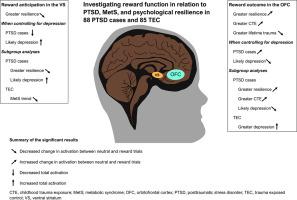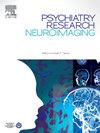Reward functioning in posttraumatic stress disorder, metabolic syndrome, and psychological resilience
IF 2.1
4区 医学
Q3 CLINICAL NEUROLOGY
引用次数: 0
Abstract
Background
Reward system dysfunction may play a role in the comorbidity of metabolic syndrome (MetS) in posttraumatic stress disorder (PTSD). Psychological resilience, through its effects on the reward system, may modulate outcomes in PTSD. Utilising a monetary incentive delay task during functional magnetic resonance imaging in a case-control study (PTSD, n = 88, trauma-exposed controls [TEC], n = 85), we aimed to investigate reward system function in relation to PTSD, MetS, and psychological resilience.
Methods
Using repeated measures analysis of variance, we assessed change in activation in the ventral striatum (VS) during reward anticipation and in the orbitofrontal cortex (OFC) during reward outcome, in relation to PTSD, MetS, and psychological resilience, controlling for possible confounders including depression severity, childhood trauma and trauma load.
Results
Activation in the VS and OFC didn't differ in relation to PTSD and MetS. When we controlled for depression severity, PTSD cases had significantly lower activation in the VS and a greater increase in activation in the OFC compared to TEC. Psychological resilience was significantly associated with decreased change in activation in the VS and increased change in activation in the OFC. We also observed a greater increase in activation during reward outcome in the OFC in those with greater childhood trauma exposure and those with exposure to fewer lifetime traumatic events.
Conclusions
The effects of depression and psychological resilience on reward system function in PTSD can be utilised towards developing interventions targeted at altering positive valence systems in PTSD.

创伤后应激障碍、代谢综合征和心理弹性中的奖励功能
背景:前向系统功能障碍可能在创伤后应激障碍(PTSD)中代谢综合征(MetS)的共病中起作用。心理弹性,通过其对奖励系统的影响,可能调节创伤后应激障碍的结果。在一项病例对照研究(PTSD, n = 88,创伤暴露对照组[TEC], n = 85)中,我们利用功能性磁共振成像期间的货币激励延迟任务,旨在研究奖励系统功能与PTSD、MetS和心理弹性的关系。方法采用重复测量方差分析,我们评估了在奖励预期期间腹侧纹状体(VS)和在奖励结果期间眶额皮质(OFC)的激活变化与PTSD、MetS和心理弹性的关系,并控制了可能的混杂因素,包括抑郁症严重程度、童年创伤和创伤负荷。结果VS和OFC的激活与PTSD和MetS无显著性差异。当我们控制抑郁严重程度时,与TEC相比,PTSD患者的VS激活显著降低,OFC激活显著增加。心理弹性与VS激活变化的减少和OFC激活变化的增加显著相关。我们还观察到,在那些童年创伤暴露程度较高的人和那些终生创伤事件暴露程度较低的人,在奖励结果期间,OFC的激活程度有更大的增加。结论抑郁和心理弹性对PTSD患者奖励系统功能的影响可用于开发针对改变PTSD正效系统的干预措施。
本文章由计算机程序翻译,如有差异,请以英文原文为准。
求助全文
约1分钟内获得全文
求助全文
来源期刊
CiteScore
3.80
自引率
0.00%
发文量
86
审稿时长
22.5 weeks
期刊介绍:
The Neuroimaging section of Psychiatry Research publishes manuscripts on positron emission tomography, magnetic resonance imaging, computerized electroencephalographic topography, regional cerebral blood flow, computed tomography, magnetoencephalography, autoradiography, post-mortem regional analyses, and other imaging techniques. Reports concerning results in psychiatric disorders, dementias, and the effects of behaviorial tasks and pharmacological treatments are featured. We also invite manuscripts on the methods of obtaining images and computer processing of the images themselves. Selected case reports are also published.

 求助内容:
求助内容: 应助结果提醒方式:
应助结果提醒方式:


